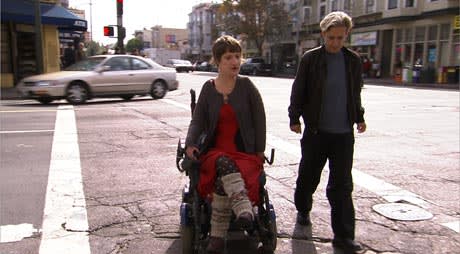"An unexamined life is not worth living, says the Plato quote that begins Astra Taylors Examined Life. In this National Film Board co-production, Cornell West, Michael Hardt, Slavoj Zizek, Pete Singer and other contemporary philosophers are asked to explain little more than how we can live a more meaningful life. Not an easy question to answer, and indeed, the film is a veritable orgy of philosophical theory, with each of the interviewees wrestling furiously with the near-impossible task of viewing human nature and ethics objectively.
A sample of the issues brought up: can secular humanists believe in objective ethics? Is human nature inherently good or evil, and is it malleable? Is revolution possible in a first-world country? Why is it more satisfying to believe that catastrophic events have a higher meaning? Can someone be disabled to the point where they have evolved beyond their species? Can humans ever attain absolute truth or is the quest for truth more important than the truth itself?
These are the types of questions debated by college students at three a.m., fuelled by caffeine or substances of questionable legality. It is to Examined Lifes credit that it has much of the same excited spirit of intellectual discovery. At 88 minutes, the film is just long enough, and Taylor has made it as dynamic as it could probably be.
Instead of standard talking heads set-ups, the philosophers are followed through unique environments: West talks about music in the back of a cab; Singer talks about ethics and consumerism while walking along Fifth Avenue; Zizek rambles about ecology in front of a garbage dump; and Michael Hardt explains cultural theory while rowing a boat. He hits a rock.
(Films We Like)A sample of the issues brought up: can secular humanists believe in objective ethics? Is human nature inherently good or evil, and is it malleable? Is revolution possible in a first-world country? Why is it more satisfying to believe that catastrophic events have a higher meaning? Can someone be disabled to the point where they have evolved beyond their species? Can humans ever attain absolute truth or is the quest for truth more important than the truth itself?
These are the types of questions debated by college students at three a.m., fuelled by caffeine or substances of questionable legality. It is to Examined Lifes credit that it has much of the same excited spirit of intellectual discovery. At 88 minutes, the film is just long enough, and Taylor has made it as dynamic as it could probably be.
Instead of standard talking heads set-ups, the philosophers are followed through unique environments: West talks about music in the back of a cab; Singer talks about ethics and consumerism while walking along Fifth Avenue; Zizek rambles about ecology in front of a garbage dump; and Michael Hardt explains cultural theory while rowing a boat. He hits a rock.




